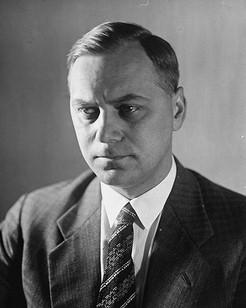Already in the early 1920s, Alfred Rosenberg complains that various political persuasions accused National-Socialism of being the extreme antithesis of whatever they themselves happened to be: capitalist according communists, communist according to capitalists. We still see this today. This kind of distortion has the convenient feature that it avoids the recognition that there could be such thing as serious political thinking not rooted in the Enlightenment.
Rosenberg’s claim that the National-Socialist struggle has become a worldwide struggle may be an allusion to Mussolini, who had come to power about three months prior to this essay. The Beer-Hall Putsch (8-9 November 1923), an imitation of the March on Rome, was attempted slightly more than a year after Mussolini’s takeover and about nine months after this essay, but the attempt to duplicate the Fascists’ rise through force and intimidation failed. Rosenberg thus turns out to have been completely correct when he said in this essay that the strength of National-Socialism was in the idea itself.
Despite what Rosenberg wrote at the time, it seems that Italian Fascism was influencing the course of the German struggle during 1923 much more than the reverse. This influence was of course curtailed after it produced a disastrous result: thereafter the NSDAP would use only lawful methods to come to power.
In 1934 and 1935, with the NSDAP in power, it would become necessary to play down the worldwide influence of National-Socialism that Rosenberg emphasized in 1923.
National-Socialism in the Global Struggle
Alfred Rosenberg
Völkischer Beobachter, 27 January 1923
(Translation by Hadding Scott, 2012)
The same has happened to National-Socialism as to every great new thought: unnoticed at first, then combated by all powers of a dissolute age with defamation, scorn, and violence, it nonetheless grew into an avalanche. Enraged, all the parties and personages that have lived on the deception of the German people look on and see themselves more and more unmasked. Clueless and terrified the charred shapes of the old national life stand there and fail to comprehend the new spirit of the German future. Calcified in heart and brain, they are completely unprepared to think the thought: that all must somehow be at fault for Germany’s misfortune; that one must sense that, today, the impossible can, must, and will be possible, and the irreconcilable be reconciled.
And thus all that is awakening supports the new popular uprising, the existence of which already proves today that the hour of German freedom someday will strike. For, in it, life has become what alone is able to beget life: faith, spirit of sacrifice [Opfersinn], and unlimited will to struggle for a great idea.
This unerring energy has in the course of years yielded its fruits. The opponents of the new people’s movement had to argue against it in spite of themselves [wider Willen]; the scales fell from the eyes of many questioners from all camps, and the struggle of global powers and worldviews suddenly appeared to them in a completely different light than previously. Ever more thorough essays appeared in the various newspapers that attempted an analysis of the growing giant. At the same time however came the defamation-campaign. One side called National-Socialism big-capitalist, monarchist, and reactionary; another saw in it a variety of Communism; the third designated it as Bavarian separatism; the fourth as an extreme unitarist movement. Meanwhile National-Socialism had answered only one question: what is of use to the entire productive German people, and what accords with its nature? – without regard for top and bottom, right and left.
If old forms shatter and the times become ripe for a rebirth of the soul [seelische Neugeburt], then all lying and defamation, indeed even all honest and sincere opposition, is in vain. The new form [Gestalt] grows and pushes aside or crushes whatever stands in its way.
Many in Germany struggle against us; many get excited about “putsches” or “planned assassinations” etc. But only very few know that National-Socialism for today’s world is much more dangerous than a putsch. It is the herald of a new age for all Europe, for the White Race everywhere.
The German struggle in turn has become a global struggle, even if nothing broader guides the German National-Socialists than unlimited love for the German people.
Thus we gather during one of the most difficult hours of the German people, in order to testify to our invincible faith in this people and to vow to apply all our strength for its resurrection from shame and humiliation.
The final victory is certainly ours.
